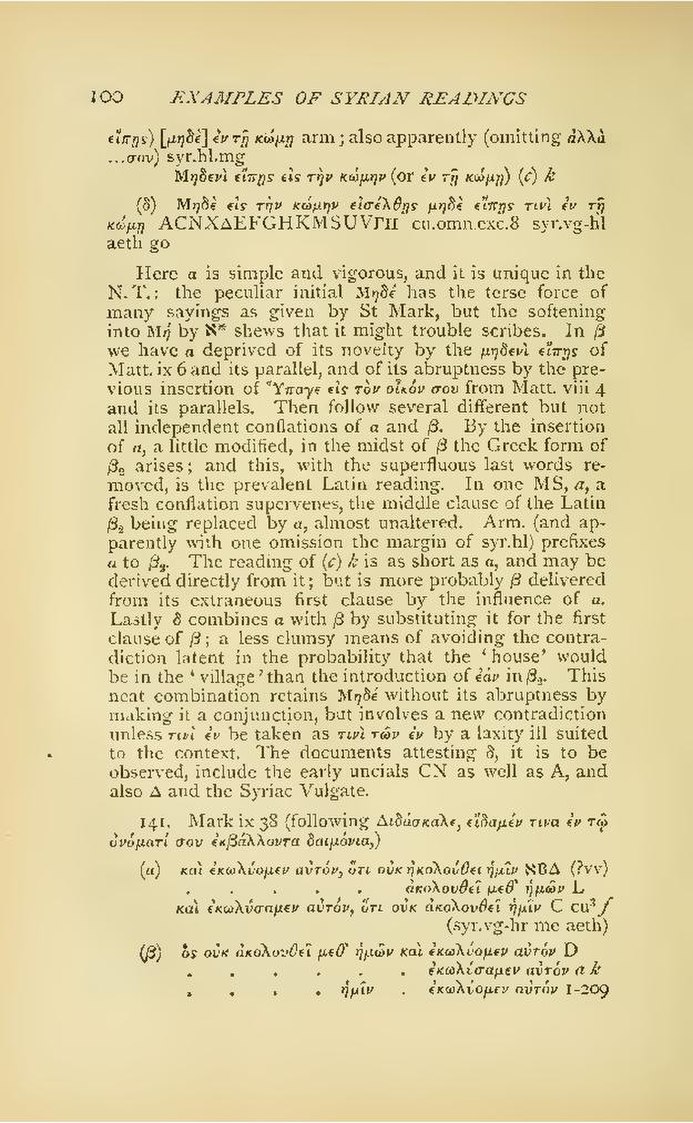εἴπῃς) [μηδὲ] ἐν τῇ κώμῃ arm; also apparently (omitting ἀλλὰ...σου) syr.hl.mg
Μηδενὶ εἴπῃς εἰς τὴν κώμην (or ἐν τῇ κώμῃ) (c) k
(δ) Μηδὲ εἰς τὴν κώμην εἰσέλθῃς μηδὲ εἴπῃς τινὶ ἐν τῇ κώμῃ ACNXΔEFGHKMSUVΓΠ cu.omn.exc.8 syr.vg-hl aeth go
Here a is simple and vigorous, and it is unique in the N. T.: the peculiar initial Μηδέ has the terse force of many sayings as given by St Mark, but the softening into Μή by א* shews that it might trouble scribes. In β we have α deprived of its novelty by the μηδενὶ εἴπῃς of Matt. ix 6 and its parallel, and of its abruptness by the previous insertion of Ὕπαγε εἰς τὸν οἶκόν σου from Matt. viii 4 and its parallels. Then follow several different but not all independent conflations of α and β. By the insertion of α, a little modified, in the midst of β the Greek form of β2 arises; and this, with the superfluous last words removed, is the prevalent Latin reading. In one MS, α, a fresh conflation supervenes, the middle clause of the Latin β2 being replaced by α, almost unaltered. Arm. (and apparently with one omission the margin of syr.hl) prefixes α to β2. The reading of (c) k is as short as α, and may be derived directly from it; but is more probably β delivered from its extraneous first clause by the influence of α. Lastly δ combines α with β by substituting it for the first clause of β; a less clumsy means of avoiding the contradiction latent in the probability that the 'house' would be in the 'village' than the introduction of ἐάν in β2. This neat combination retains Μηδέ without its abruptness by making it a conjunction, but involves a new contradiction unless τινὶ ἐν be taken as τινὶ τῶν ἐν by a laxity ill suited to the context. The documents attesting δ, it is to be observed, include the early uncials CN as well as A, and also Δ and the Syriac Vulgate.
141. Mark ix 38 (following Διδάσκαλε, εἴδαμεν τινα ἐν τῷ ὀνόματί σου ἐκβάλλοντα δαιμόνια,)
(α) καὶ ἐκωλύομεν αὐτόν, ὅτι οὐκ ἠκολούθει ἡμῖν א ΒΔ (?νν)
καὶ ἐκωλύομεν αὐτόν, ὅτι οὐκ
ἀκολουθεῖ μεθ' ἡμῶν L
καὶ ἐκωλύσαμεν αὐτόν, ὅτι οὐκ ἀκολουθεῖ ἡμῖν C cu3 ƒ
(syr.vg-hr me aeth)
(β) ὃς οὐκ ἀκολουθεῖ μεθ' ἡμῶν καὶ ἐκωλύομεν αὐτόν D
ὃς οὐκ ἀκολουθεῖ μεθ' ἡμῶν καὶ ἐκωλίσαμεν αὐτόν a k
ὃς οὐκ ἀκολουθεῖ μεθ' ἡμῖν καὶ ἐκωλύομεν αὐτόν 1-209
